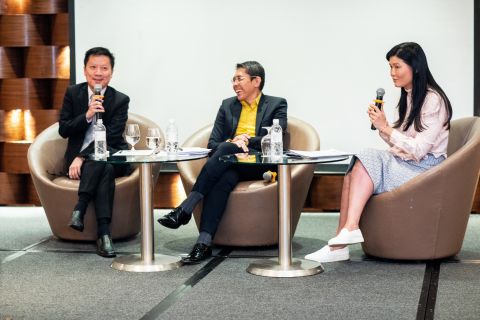
By Rebecca Tan
SMU Office of Research & Tech Transfer – With an increased – and increasingly vocal – awareness of sustainability issues among the general public, green has become the new black for companies seeking to burnish their reputation in the eyes of both customers and shareholders. While more companies are now thinking about sustainability and other corporate social responsibility (CSR) issues, what is it that makes some companies more likely to adopt CSR initiatives than others?
This question guides the research of SMU Assistant Professor Liang Hao of the Lee Kong Chian School of Business, who first became interested in the topic when he started his PhD studies in the wake of the global financial crisis. “At the time, there were a lot of debates about the role of finance in the economy and people began to question whether finance benefits or hurts society,” he said. “That made me realise that finance is not only about making more money, but should be about doing so in a more sustainable way.”
Shareholders or stakeholders first?
To answer the question of what makes some companies more socially conscious than others, Professor Liang conducted a comprehensive study of 23,000 companies from 114 different countries to see which factors most strongly influenced CSR ratings. This research was published as a paper titled “On the Foundations of Corporate Social Responsibility” in the Journal of Finance in 2017.
One prevailing theory is that firms ‘do good to do well’, engaging in CSR activities to enhance their profitability. What Professor Liang found, however, was that the main characteristic influencing CSR ratings was actually the type of legal system a company finds itself in. “The legal system – what we call legal origin – explains most of the cross-country differences in company-level CSR,” Professor Liang said.
In common law countries influenced by the British legal system, which puts more emphasis on shareholder protection, companies behave in such a way as to maximise shareholder value, he explained. Other countries more influenced by German civil law, on the other hand, put more emphasis on stakeholders, which is why most German-speaking companies have two-tier boards where stakeholders such as employees and customers also sit on the board to co-determine the company’s direction.
“We find that in civil law countries, the level of CSR tends to be higher compared to common law countries,” Professor Liang said. “In fact, we found that legal origin had more explanatory power than any other factor, including the company’s financial performance or the country’s regulations.”
These findings imply that policymakers could focus on tweaking their legal structure if they would like to encourage more socially responsible behaviour, Professor Liang said. In Singapore, which is a common law country, Professor Liang’s research informed a discussion by the country’s economic council on how the public governance code could be re-written to leave more room for stakeholders.
When the state has a stake
While the legal origin of a company is the main determinant of its CSR ratings, a slightly different picture emerges when we zoom in from the broad theme of CSR into its individual components, Professor Liang said. When it comes to how environmentally conscious a company is, for example, whether it is privately held or state-owned makes a difference, he explained.
Based on an analysis of international sustainability ratings, Professor Liang found that state-owned companies are more actively involved in promoting environmental initiatives, compared to private companies. “This is especially true for companies held by domestic governments instead of sovereign wealth funds,” he added.
“Some people find that this is an obvious conclusion because the role of the government is to deal with externalities and solve social problems,” Professor Liang said. “But there are also many others who are sceptical of this finding because state-owned enterprises have been criticised for being inefficient and lack the incentives to solve environmental problems.”
However, his findings show that not only do state-owned companies engage in more environmental initiatives but that this engagement does not come at the expense of their operating performance. “This means that sustainability initiatives do not come at cost for shareholders, but nonetheless have important implications for society at large through the environmental impact,” Professor Liang said.
This research also has implications on the so-called state capitalism model, he said, seen not only in China but also Western Europe, particularly after the financial crisis. “While our previous focus was more on the financial performance of state-owned companies, perhaps a lot of the debates we had in the past were because we assumed governments were competing with private companies on profitability, whereas there is growing recognition of the role of state-owned companies in solving social problems.”
Bending the rules for unicorns
Given how important the balance between stakeholders and shareholders is in determining CSR outcomes, Professor Liang is next investigating the impact of allowing dual-class shares, where certain shareholders have more voting power than others. Traditionally, each share entitles the shareholder to a single vote, but ‘unicorn’ companies such as Grab and Ant Financial tend not to like the ‘one share, one vote’ rule as it dilutes the decision-making power of founders and CEOs.
While countries such as Singapore and Hong Kong have recently changed their regulations to allow dual-class shares in a bid to attract more unicorns, the impact of such a structure on shareholders, stakeholders and society as a whole is not clear. To investigate this contentious issue further, Professor Liang has been awarded an Academic Research Fund Tier 2 grant from the Ministry of Education, along with his co-principal investigator Assistant Professor Zhang Wei of the SMU School of Law.
“This will be an international study related to CSR stakeholder welfare looking at the implications for both stakeholders and shareholders and how dual-class shares influence a company’s profitability and CSR efforts,” Professor Liang said.
Back to Research@SMU May 2019 Issue
See More News
Want to see more of SMU Research?
Sign up for Research@SMU e-newslettter to know more about our research and research-related events!
If you would like to remove yourself from all our mailing list, please visit https://eservices.smu.edu.sg/internet/DNC/Default.aspx

